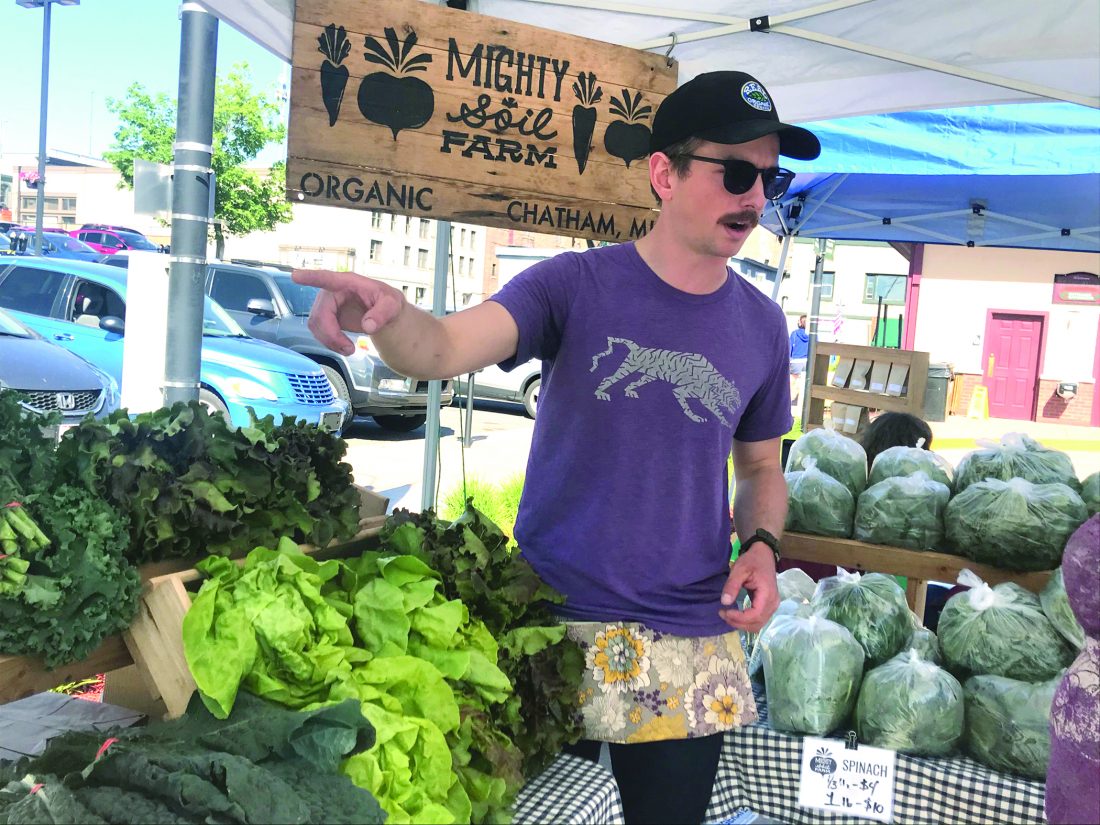Farm Fresh Food Guides updated

Joe Newman of the Chatham-based Mighty Soil Farm sells flowers and vegetables at the Wednesday Downtown Marquette Farmers Market. To help people find locally sourced food, the Upper Peninsula Food Exchange has revamped its Farm Fresh Food Guides. (Journal photo by Christie Mastric)
MARQUETTE — To support local farmers and encourage consumers to purchase local food, the Upper Peninsula Food Exchange has revamped its Farm Fresh Food Guides.
Alex Palzewicz, market manager of the UPFE Online Marketplace, said changes include whether a farm has more delivery options.
“A lot of farms have added online farm stores, so that is one of the bigger changes,” Palzewicz said.
Regardless of the delivery method or whether there’s something like the COVID-19 pandemic affecting food production, Palzewicz stressed that strengthening local food security is needed.
“It’s always been important and will continue to be important for us to support our local producers,” she said.
Palzewicz pointed out that community-supported agriculture shares still are available in Marquette County.
CSA involves individuals who buy shares of a farm’s harvest in advance.
The handouts, which can be found online at upfoodexchange.com/farm directories, contain information on local farms that offer CSAs, online stores and other remote purchasing options for every county in the U.P. Buying local has many benefits, from the immediate and obvious nutritional gain to the bigger picture economic growth and resiliency, according to the UPFE.
“To start, locally grown fruits and vegetables taste better and are better for you,” it said in a news release. “Food grown in your own community was likely picked just days ago and is fresh, crisp, loaded with flavor and packed with nutrients.”
Local food supports local farm families, it said, since local farmers who sell direct to consumers or at retailers that support local food systems are compensated much more fairly for their product. By purchasing locally grown food, people give a farmer the opportunity to do what they love and make a living doing it.
Local food builds community and the economy as well.
“When you buy direct from a farmer, you’re re-establishing a time-honored connection between the eater and the grower,” UPFE said. “Meeting face-to-face with your local growers establishes a level of trust and understanding that isn’t possible within large-scale food production.
“Local food supports the local economy. When you buy from a local farmer or business, you’re circulating money directly back into the local economy, creating stability within your community.”
UPFE also said that supporting neighbors and communities provides a sense of social awareness and civic participation.
“Each time you buy local food, you’re strengthening your local and regional food systems and creating resiliency in your community. Having a strong, diverse food system is crucial and local farmers help ensure the community has a steady supply of food,” it said.
The Farm Fresh Food Guides help people connect directly to food producers in their community and they also support them by shopping at a local farmers market or grocery store that stocks local product.
“By supporting local growers and producers today, you help ensure that there will be farms in your community tomorrow and that future generations will have access to nourishing, flavorful and abundant food,” UPFE said.
Marquette County farms listed in the guides include Dukes Farm, Full Plate Farm and Tonella Farms in Skandia; Seeds & Spores Family Farm and Little Parsley Farm in Marquette; Partridge Creek Farm in Ishpeming; and Swanzy Farm in Gwinn.
Joe Newman, market farmer with Kate Debs of Mighty Soil Farm in Chatham, was on hand at the Wednesday Downtown Marquette Farmers Market to sell organic vegetables and they were definitely in demand. The baby carrots were sold out just minutes after the market opened, he said.
Newman believes buying local food keeps dollars in the local economy and is better for the environment.
“Knowing where your food comes from is important,” he said.
UPFE serves as a resource portal for farmers, businesses and individuals looking to connect with and actively participate in local food systems. Community partners from across the U.P. coordinate and support local food projects of all kinds, including farm to school initiatives, public policy work, community education, food safety training and business development.
Key to the work of the U.P. Food Exchange is the online marketplace, a food hub that aggregates local food products for institutional purchasers.
For more information about UPFE, or to obtain copies of the local food handbills free of charge, visitupfoodexchange.com or contact via email atinfo@upfoodexchange.com.
Christie Mastric can be reached at 906-228-2500, ext. 250. Her email address is cbleck@miningjournal.net.




